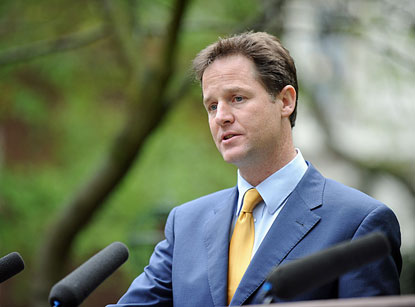By Richard Johnstone | 19 February 2013
Twenty more cities in England are to be given extra economic powers as part of the government’s City Deals programme, Deputy Prime Minister Nick Clegg has announced.

In a speech at the Mansion House last night, Clegg said that ministers would now start discussing devolution agreements with the cities, which include Brighton & Hove, Plymouth and Preston, plus some wider areas, such as Coventry and Warwickshire and Sunderland and the Northeast.
The 20 ‘wave 2’ areas have worked with their Local Enterprise Partnership to put forward proposals for additional powers following the publication of a shortlist last October. Bids were assessed based on whether they were ambitious, robust and could attract private sector investment.
Ministers initially stated that only proposals with the biggest potential impact would be approved but they have now decided to open discussions with all the areas.
Among the proposals, Brighton & Hove want to grow their environmentally focused technology sector; Coventry and Warwickshire plan to build on existing strengths in advanced manufacturing and engineering, while Ipswich seeks powers to improve training for local people.
A joint bid by Southampton and Portsmouth intends to drive the growth and diversification of the maritime sector in the area, while Sunderland/Northeast wants to expand its manufacturing base.
Clegg said the government would now work to develop the proposals in more detail and reach accords over the next year.
The first round of deals, with the eight core cities in England outside London last July, included devolution of some of Whitehall’s transport and skills funding to town halls. This could be repeated in the second tranche of agreements.
The 20 cities have the chance to agree the powers they need to boost economic growth, Clegg said.
‘Even more places will be free from Whitehall control and have the tools to power their own growth. These deals help cities and their wider areas make once-in-a-generation changes that will be felt by everyone across their region.
‘Rather than let our industries and communities wither, we need to free up cities outside of London that have their own unique selling points.’
Cities minister Greg Clark added that although each city in England was different, they had been treated identically by central government for ‘decades’.
He added: ‘City Deals are a quiet revolution in the way Britain is governed. Rather than London laying down the law, cities have the right to do things their way. The stories of their own futures will be as individual as their unique histories.’
The 20 cities and city-regions are: the Black Country; Bournemouth and Poole; Brighton and Hove; Greater Cambridge; Coventry and Warwickshire; Hull and Humber; Ipswich; Leicester and Leicestershire; Milton Keynes and the South East Midlands; Greater Norwich; Oxford and Oxfordshire; Reading and Central Berkshire; Plymouth; Preston; Southampton and Portsmouth; Southend and South Essex; Stoke and Staffordshire; Sunderland and the North East; Swindon and Wiltshire; and Tees Valley.
The areas, proposed by the cities themselves and in some cases expanded from the initial bid, account for 41% of England’s population and 39% of the jobs market. When combined with the core cities, 71% of the population of England would be included in City Deals.
Responding to the announcement, the Local Government Association said it was a ‘very positive’ step, which reflected ‘the government’s increasing recognition that local areas are best placed to drive economic growth’.
But Peter Box, chair of the LGA’s economy and transport board, said there was a need to ‘accelerate the pace and scale of devolution and make deals available to all areas that want them’.
He added: ‘There is clearly varying degrees of buy-in from different government departments. We hope that the March Budget will carry through the promise of the Autumn Statement by confirming that all of the tools and levers needed to drive local growth will be made available to councils, local businesses and their partners.’






















